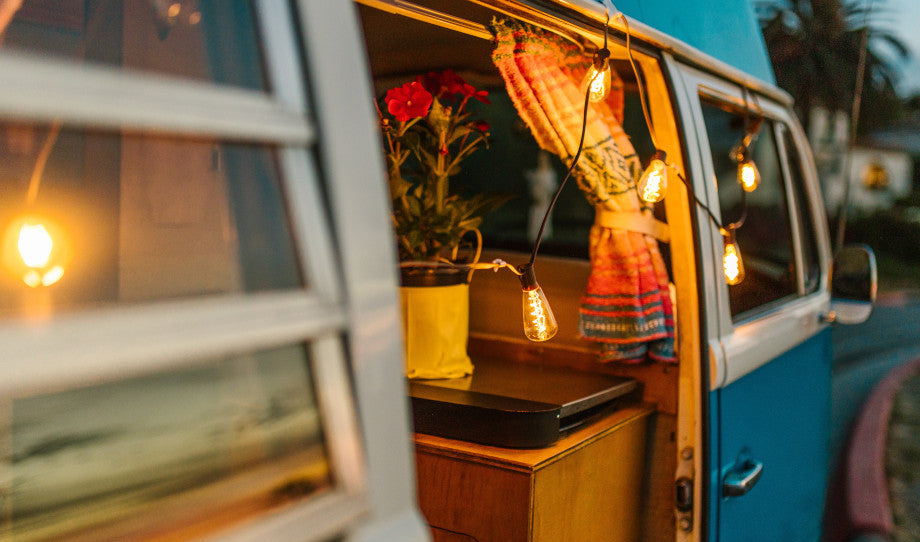
Five Tips for Camper Expansion from two Experts
Share

Do you dream of upgrading a camper yourself? The experienced camper builders Esther & Kay from the camper conversion blog by NOMADS are happy to help you on your way to your goal! With the expansion of two campers, the two have gained the necessary experience and know what challenges await you. In this blog, they have five must-know tips you need to know before you start upgrading your camper, or even before you buy an empty van. Their camper conversion tips will not only protect you from mistakes and surprises later on, but will also make the whole building project of your future camper more flexible.
Tip 1: You have the Idea to upgrade a camper? Rent a camper first!
Even before you buy a van, it's important to find out if traveling in a camper is right for you. Also, before you buy a van, you want to know what amenities you like in a camper. When we built our first camper van in New Zealand, we had never camped in a camper van before. The big downside to this was that we had absolutely no idea about a workable interior design. For example, we realized only later, after we had been on the road for a few weeks, that some wardrobe layouts were not built to fit. Gradually, we realized that we didn't find the daily bed setup ideal, so a fixed bed suited us better. It is sometimes said, "The best camper is your next camper" and for good reason. So that you don't build a camper that you're not completely happy with later, it's a good idea to borrow or rent a camper first. In this way you can find out if traveling with a camper feels right for you and which amenities the camper should be equipped with.
Do you want to get some building ideas for campers in advance? Then read our blog: Camper expansion ideas.

Tip 2: Choose a van that suits you
Avoiding camper conversion mistakes actually starts when you buy a panel van. It's important that you buy a van that fits your needs. Search specifically based on your desired features, your budget, and keep your door design preferences in mind. Don't just focus on your favorite brand! We've listed the most popular vans that convert to motorhomes in a handy blog for you.
Take a look: Which car to convert to camper
Once you have found a suitable van, it is important to make a sketch of the desired floor plan. Do all the fittings fit? Then make a test drive. Have you made a successful test drive? Then have an independent inspection done and ask about the maintenance history so you don't buy a pig in a poke. We unfortunately experienced something like this when we bought our car in Canada. Unfortunately, that experience cost us a lot of money. So avoid spending money on unnecessarily expensive repairs.

Tip 3: Produce design drawings
Good preparation is half the battle! Construction drawings simplify the building process and prevent surprises later. Therefore, make an overview of the required and desired facilities and then include them in the construction drawing of the floor plan of your mobile home. Then make construction drawings of all individual parts such as bed, kitchen and (hanging) cabinets. Don't forget to include space for your water and electricity supply as well as your gas bottle in the construction plans.
Especially when building our first motorhome, we sometimes skipped making construction drawings. This resulted not only in sawing errors, but also in surprises that caused us to have to revise our construction plans every now and then. Making construction drawings is time-consuming, but they really form the basis for building a camper yourself!
You are not quite sure about the design yet? Then lay out several pieces of cardboard on the floor and play with the design within the available space of your camper. Optionally, you can also use Google Sketchup as a design program. For more assistance in creating a good interior design, check out this blog: RV Floor Plan.

Tip 4: Make a plan!
Perhaps the most important camper conversion tip: Make a plan (or project overview)! There's a lot that goes into building a van. The more amenities you want on board, the more complex the construction project becomes. For example, think about insulating, lining walls and ceilings, making furniture, but also installing camper electrics for RVs. Planning is really necessary to prevent you from thinking, "Oops, I should have built that first." In particular, running power cables requires preparation. For example, do you want to hide electrical cables in the crossbars of your bus? Then do that before you insulate. You're probably thinking, "super logical," but planning ensures that you go through the steps of your camper conversion project in the right order.



Bonus Tip: Free E-Book Camper Expansion
Are you excited after reading this blog and want to upgrade a camper too? Esther and Kay from by NOMADS have written an e-book Camper Ausbau that you can currently download completely free on their website. Click here to download the free e-book camper extension.